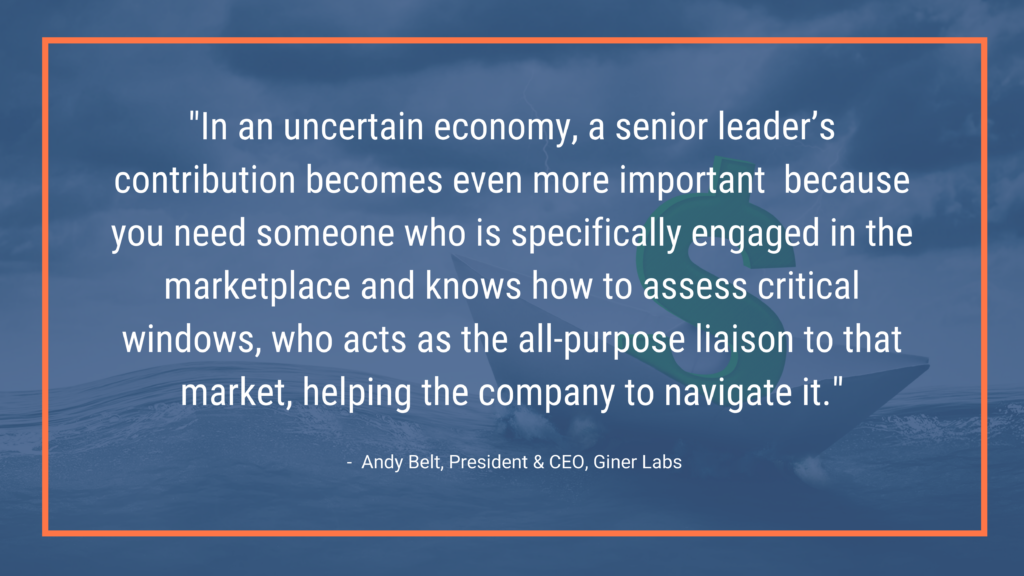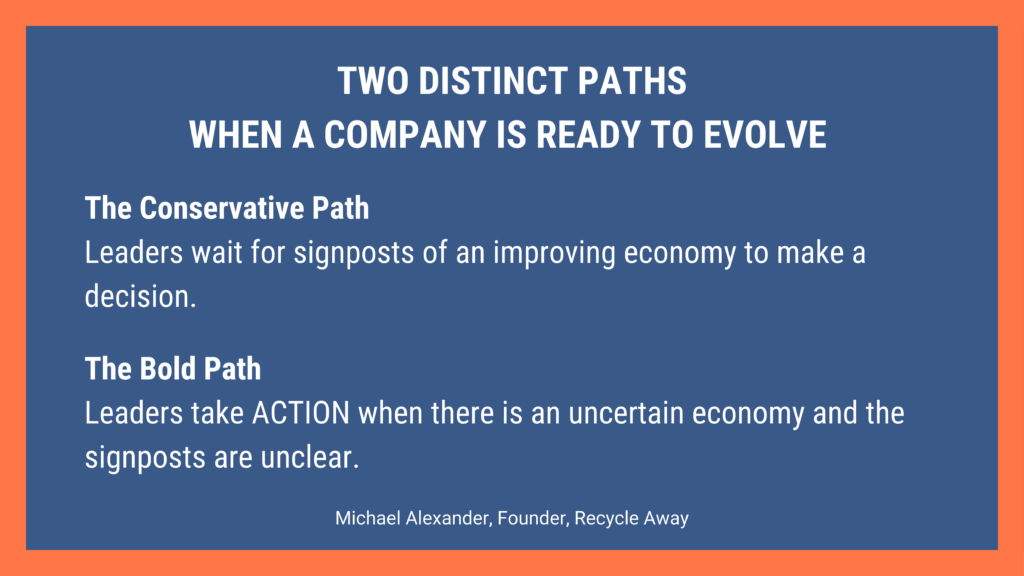
These days, the recession question is being posed and parsed in multiples. From “are we in a recession?” to “what’s a recession and how close are we to one?” to “how bad could the recession be if we do enter one?”
With inflation hovering at 7.11%, nearly 3.9% above the long-term average of 3.27%, and the Federal Reserve raising its short-term borrowing rate again in November by 75 basis points to target 3.75%-4% to try and tame inflation, where the economy will land becomes a guessing game month to month, making forecasting unpredictable.
Often in this environment, with a recession looming, the immediate reaction is to lay off the highest compensated, most senior sales leaders to save money. Instead, holding fast and doing the opposite can advance your company and the success of your sales team in this uncertain economy. Here, we talk to business leaders who share their strategic sales planning goals and how they strengthened their companies by being proactive, retaining employees, and solidifying their sales infrastructure to provide a stable foundation for sustained and continued growth during downward shifts in the economy.
In-Depth Look: Hiring a V.P. for Business Development in an Uncertain Economy
Andy Belt, president, and CEO at Giner Labs (Newton, Massachusetts), a world-leading center in electrochemical R&D, has led the company as president since 2014. He was also the president and CEO of Giner ELX, a subsidiary of Giner Labs, from 2017 to June 2020, at which time it was sold for $80 million. Following, he took the helm of Giner Labs as both its president and CEO.
With the Giner ELX deal behind him, Belt needed to fill a crucial vacancy for a senior sales executive who had departed. The intention? To recruit someone with greater seniority and experience than the person who previously held the role. He was seeking to hire a vice president for business development.
“We did so deliberately,” Belt said. “The business development role is the most important role in the company, as is often the case in a medium-sized company.”
In an uncertain economy, a senior leader’s contribution becomes even more important, Belt said, because you need someone who is specifically engaged in the marketplace and knows how to assess critical windows, who acts as the all-purpose liaison to that market, helping the company to navigate it. A strategic senior sales hire is an investment in someone who can open new channels and markets, and create and nurture new partnerships and prospects. They have the expertise and experience to be strategic, creative, and bring innovative workarounds to weather a recession.

A senior-level salesperson is cross-functional, interfacing with multiple departments, internally — legal, finance, marketing, and R&D — and externally, with prospective clients, partners, and customers.
“They are engaged and interested in bigger possibilities, collaboration possibilities, and they enjoy talking to other people in the marketplace, and that leads to insights that can open up channels for joint initiatives or strategic transactions,” Belt explained.
“It is true that when the focus is on saving money, they are expensive, but you pay them basically to maintain a revenue stream — it is not just closing sales; it is closing good sales and driving value.”
Senior sales staff also save us money, he said, because they have an external perspective about our customers and the marketplace, bringing insight about areas that will not add value or would otherwise hamstring the organization.
“They will know about the market and act as a focusing, magnifying lens of the demands of the customer. And judiciously applying that voice, the voice of the customer, will help to save us money,” he said.
Plus, the value of a deeply experienced senior sales leader is the energy and drive they bring to the whole company — “someone who fights for us, sees the opportunities, and will do their best to translate our technology into something that is going to sell in the marketplace,” he said.
“The other thing worth remembering: It is harder to recruit people when it’s ‘all systems go,’ ” Belt said.
When the marketplace is stronger, it can be hard to get the best minds and candidates at a reasonable rate. Tactically, he said, a downturn can be an opportune time to invest in someone who may cost more in the short term, “but then you’ve got someone in place who has an incentive to stay with you as the market begins to recover, and who will put you in a better position” when that happens.
In-Depth Look: Hiring a CEO in an Uncertain Economy
Recycle Away (Brattleboro, Vermont), a leading national eCommerce B2B retailer and distributor provides custom recycling and sustainability solutions to corporations, municipalities, and nonprofits. Michael Alexander, founder, president, and CEO launched the company after serving as director of policy and research for the National Recycling Coalition; program manager for the Northeast Recycling Council; and analyst with the New York State Office of Recycling Market Development.
Recycle Away launched in 2009 and has grown to a $15-20 million per year business, Alexander said.
Without a doubt, Alexander said, the onset of the COVID-19 pandemic and the stall in American business that followed increased his tolerance for risk because he realized there are two paths for a company ready to evolve: the conservative path, where leaders wait for signposts of an improving economy to make a decision, or the bolder path where action is taken when there is an uncertain economy and the signposts unclear. Taking the bold path, he said, allows a company to avoid being caught “flat-footed” when the economy turns around again.

“And you know it is going to turn around,” Alexander said. “You lose more by not being able to capitalize on the upswing when you stay conservative and ‘save’ yourself money” during the downswing.
Rather than conserving funds, Alexander said, he instead made an investment during recessionary times in expertise, system improvements, and a senior strategist who would come in and build a winning team, and a winning company culture, for when the economy picked up. “That’s where I can be ready,” he said.
Interestingly enough, while Alexander’s hiring search for a new senior-level person began with the need for a chief revenue officer, in the end, working through the DANA Associates process, his thinking shifted to hiring a CEO — to replace him.
“Like a lot of CEOs, I’m burned out from the pandemic, and I don’t think I have the A-game, whereas, during the pandemic, I had no choice but to bring my A-game every day,” he said. “I’ve used all my tricks to get through the pandemic, and now I wanted to see what someone else could do to position the company for the next wave — for when inflation ends as well as the war in Ukraine and high-interest rates — and there is a resurgence in economic activity. That is where the real payback is, rather than squirreling things away to save a few dollars.”
In unpredictable times, a seasoned senior-level professional, one who may not even come from the same industry sector, will have experience in tough markets, he said. Someone who is hands-on, actively interacting with customers, and who will explore what is top of mind for them; a choice strategist who knows channels and how to motivate people, write a sales playbook, and grow the business by making strategic decisions. So when the recovery begins, the company is already positioned for the customer to buy,” Alexander said.
In potentially recessionary times, success hinges on making investments in strategic senior sales leadership so companies can position themselves to not only survive but thrive in a down market. Companies that maintain this edge will be ahead of their competitors during economic uncertainty and poised for greater growth when the market turns around.
At DANA Associates, we are dedicated to helping you find and hire the right strategic sales leaders to achieve your business and organizational goals. Contact us today so we can discuss how to take the next steps in securing your company’s growth and success.

